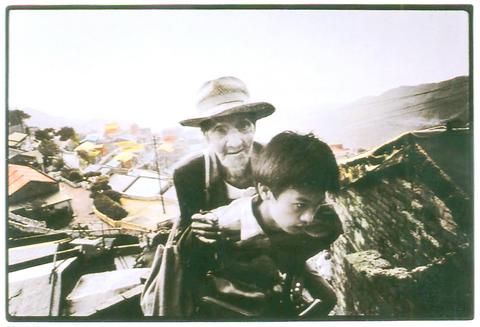The easing of censorship laws in the 1970s allowed a group of young Taiwanese directors, among them Edward Yang and Hou Hsiao-hsien (
"None of us thought about revolution when we were making those movies," director Chen Kun-ho (陳坤厚) recalled. "We just wanted to make films that were different from our teachers' films."
The advent of New Taiwan Cinema lifted local filmmaking from the staid genres of martial arts, romance and propaganda to a new level that questioned official views of Taiwan's society. In examining the effects of rapid urbanization on traditional society, it gave voice to a new representation of a modern, mutli-ethnic Taiwan.

PHOTO COURTESY OF THE GOLDEN HORSE FILM FESTIVAL
A retrospective of 40 films entitled Twenty Years of New Taiwan Cinema will examine the legacy of those films two decades later.
Three of Hou Hsiao-hsien's movies will show at the retrospective. They are The Sandwich Man (
The former is autobiographic. The latter is a nostalgic movie about young love.
Edward Yang's acclaimed urban critique Terrorist (
A similar retrospective will also take place at Busan's international film festival, from Nov. 14 to Nov. 23. From New Wave to Independent: Taiwanese Cinema 1982-2002 will see Taiwan's acclaimed director Hou Hsiao-hsien present 20 Taiwanese films at Asia's largest film festival.
These retrospectives are a time to celebrate and also a time to reflect on the current state of Taiwanese cinema.
"At that time [20 years ago], a not-so-popular film of mine made NT$7 million at the box office," Chen Kun-ho said. "But now, when a local film makes more than NT$2 million it's considered a big hit and the crew corks open a bottle of champagne."
Sunny Yu (
"By the time I got used to things, the industry was shrinking and now it has disappeared," Yu lamented.
Yu left the film industry in 1991 to work in television as an actor and producer.
Actress Wen-ying (文英) has been acting in Taiwanese films for 20 years. She says that 20 years ago the budget for a film was around NT$8 million and the price of a movie ticket was NT$60. Tickets now cost at least NT$200, but "we still have budgets of NT$8 to NT$10 million. This isn't even enough to buy lunch boxes for the crew," she said.
In addition to 28 films selected as representative of New Taiwan Cinema, the screening will include the films of 12 successor filmmakers such as Ang Lee (

June 23 to June 29 After capturing the walled city of Hsinchu on June 22, 1895, the Japanese hoped to quickly push south and seize control of Taiwan’s entire west coast — but their advance was stalled for more than a month. Not only did local Hakka fighters continue to cause them headaches, resistance forces even attempted to retake the city three times. “We had planned to occupy Anping (Tainan) and Takao (Kaohsiung) as soon as possible, but ever since we took Hsinchu, nearby bandits proclaiming to be ‘righteous people’ (義民) have been destroying train tracks and electrical cables, and gathering in villages

Swooping low over the banks of a Nile River tributary, an aid flight run by retired American military officers released a stream of food-stuffed sacks over a town emptied by fighting in South Sudan, a country wracked by conflict. Last week’s air drop was the latest in a controversial development — private contracting firms led by former US intelligence officers and military veterans delivering aid to some of the world’s deadliest conflict zones, in operations organized with governments that are combatants in the conflicts. The moves are roiling the global aid community, which warns of a more militarized, politicized and profit-seeking trend

The wide-screen spectacle of Formula One gets a gleaming, rip-roaring workout in Joseph Kosinski’s F1, a fine-tuned machine of a movie that, in its most riveting racing scenes, approaches a kind of high-speed splendor. Kosinski, who last endeavored to put moviegoers in the seat of a fighter jet in Top Gun: Maverick, has moved to the open cockpits of Formula One with much the same affection, if not outright need, for speed. A lot of the same team is back. Jerry Bruckheimer produces. Ehren Kruger, a co-writer on Maverick, takes sole credit here. Hans Zimmer, a co-composer previously, supplies the thumping

Dr. Y. Tony Yang, Associate Dean of Health Policy and Population Science at George Washington University, argued last week in a piece for the Taipei Times about former president Ma Ying-jeou (馬英九) leading a student delegation to the People’s Republic of China (PRC) that, “The real question is not whether Ma’s visit helps or hurts Taiwan — it is why Taiwan lacks a sophisticated, multi-track approach to one of the most complex geopolitical relationships in the world” (“Ma’s Visit, DPP’s Blind Spot,” June 18, page 8). Yang contends that the Democratic Progressive Party (DPP) has a blind spot: “By treating any